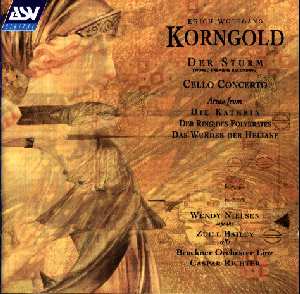************************************************************** EDITOR’s RECOMMENDATION August 2003 **************************************************************
Compilation:
Erich Wolfgang KORNGOLD (1897-1957)
Cello Concerto (from Deception)
Arias from Korngold’s operas etc.
Wendy Nielsen (soprano)
Zuill Bailey (cello)
Konzertvereinigung Linzer Theaterchor
Bruckner Orchester Linz conducted by Caspar Richter
Available on: ASV CD DCA 1146
Running Time: 58:20
Crotchet Amazon UK Amazon US

CD contains:-
Arias fromPlus:-
- Der Ring Des Polykrates (1913)
- Das Wunder Der Heliane (1922-1927)
- Die Kathrin (1933-1937)
- Much Ado About Nothing: Festmusik; Trauermusik; Schlusstanz (1918-1919)
Cello Concerto (1946)
- Der Sturm (1913)
- Waltz from Der Schneemann (1908-1909)
(recorded in Bruckner Hall, Linz, Austria, 2-8 January 2003)For film score fans, the main item of interest here is Korngold’s brief and concentrated, but highly dramatic Cello Concerto developed from the concerto the composer wrote for the 1946 Warner Bros film, Deception that starred Bette Davis caught in a love triangle between her teacher, Claude Rains, playing an egomaniac composer and Paul Henreid as a cellist and former lover believed lost in war but recently returned from a concentration camp. Zuill Bailey gives a powerfully intense reading with a deeply felt adagio (and a magical cadenza) while Richter gives excellent support full of dramatic urgency and attack, the orchestra really growling in places yet tender and dream-like in the quieter sections.
Der Sturm, for chorus and orchestra, receiving not only its premiere recording here but also its first ever performance, was written when the composer was only sixteen. It is a sound picture of a storm at sea and is a setting of a combination of verses by Heinriche Heine. The work is substantial and complex with intricate harmonies and shifting rhythms and tempi. Korngold’s tempest storms and shrieks as he evokes ‘A living mountain of water’ and ‘an abyss yawning… there towers a white wall’ but the ending sooths with the serenity of a star-bejeweled sky.
Incredibly Korngold’s lovely Waltz from Der Schneemann (The Snowman) was written when the prodigy was only eleven. It maybe derivative of the Viennese styles prevalent then but there is impressive sophistication and refinement here. Richter delivers a reading full of old world charm.
An earlier ASV album (CD DCA 1131) included a suite from Korngold’s incidental music for a 1920 stage production of Shakespeare’s Much Ado About Nothing. Conductor Caspar Richter has exhumed three more movements for this compilation. Festmusik is a sparkling high-spirited piece, Trauermusik (nodding towards Grieg) is a measured melancholic nocturne that becomes magical when a solo piano enters to suggest a serene sylvan landscape, and Schlusstanz is a reprise of the Hornpipe heard in the earlier suite but with a resounding conclusion.
The remaining items in this album comprise arias from three Korngold operas: the charming ‘Diary Song’ in which heroine Laura muses over past romances comes from Korngold’s earliest opera, Der Ring des Polykrates written when the composer was only sixteen; while the excerpts from Korngold’s Die Kathrin, his last opera, banned by the Nazis and which never really caught on after World War II, are the light-hearted and swaggering march (shades of The Adventures of Robin Hood) as the hero marches off to war) and Kathrin’s aria in prayer for his protection, she despairing and left pregnant. In between we have the intensity of Der Wunder der Heliane the story about a bleak country where the ruler has banned all love and joy. His marriage is unconsummated and his wife, the saintly Queen Heliane, comes under the spell of a young stranger who preaches love to the downtrodden populace. Korngold uses a huge orchestra for this opera, The album includes three excerpts: the glorious introduction to Act I when angelic voices sing in a chapel as the stranger lies manacled in a cell below; the demonic march, that is the Prelude to Act II, suggesting the brutality of the regime; and Helene’s Act II aria ‘I went to Him’ in which she insists on the purity of her meeting with the stranger (although she disrobes for him) while the orchestra in its mounting sensuality suggests her real feelings. Wendy Nielsen is expressive enough in all three arias but her voice most secure in her mid-range has hardly the lyric soprano qualities required for Korngold’s earliest opera.
For those curious enough to want to explore Korngold’s non-film music this new release is most rewarding.
Ian Lace
4
Return to Index